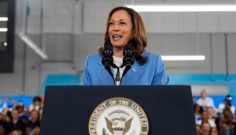BTN News: In a significant move to address economic concerns, U.S. Vice President Kamala Harris has unveiled an ambitious plan aimed at curbing price speculation in the food and grocery sectors at the federal level. Harris’s proposals also include a tax credit of up to $6,000 per child for families during the first year of a baby’s life and up to $25,000 for first-time homebuyers to assist with their down payment. These populist initiatives reflect Harris’s commitment to tackling the financial burdens faced by millions of Americans as she steps into the 2024 presidential race as the Democratic Party’s nominee.
During a campaign event in Raleigh, North Carolina, a key battleground state, Harris made it clear that her administration would prioritize reducing costs and enhancing economic security for all Americans. In her first major speech on economic policy, she detailed her plans to provide tax relief for over 100 million Americans belonging to the middle and lower income brackets. The speech emphasized her commitment to combating rising prices in essential areas like food and housing, issues that resonate deeply with voters as the election approaches.
Harris took the opportunity to draw sharp contrasts with her Republican opponent, former President Donald Trump, whose economic policies she criticized as favoring the wealthy at the expense of ordinary Americans. She specifically targeted Trump’s plan to implement massive tax cuts for billionaires and corporations, framing her own proposals as a necessary countermeasure to ensure fairness and reduce economic disparities. Harris’s campaign has consistently focused on holding large corporations accountable, particularly in sectors like meat processing, where consolidation has led to significant price hikes for consumers.
The Vice President pointed out that the price of ground beef has surged by nearly 50%, attributing this to the monopolistic practices of big food companies, which, according to her, have recorded their highest profits in two decades. Harris’s campaign argues that the lack of competition in such industries allows these corporate giants to squeeze farmers and hike prices for consumers, exacerbating the economic challenges faced by ordinary Americans.
In response to Harris’s proposals, Trump and his campaign have been quick to criticize, labeling her plans as “communist” and warning that they would lead to adverse effects like food shortages, rationing, and even higher inflation. Trump’s campaign went as far as releasing a memo titled “The Comrade Kamala Goes Full Communist,” further escalating the rhetoric in what is shaping up to be a contentious election battle.
However, economic experts caution that the impact of any single policy on inflation is likely to be limited, especially given the Federal Reserve’s independent role in setting interest rates. The current economic landscape shows some signs of improvement, with inflation falling below 3% for the first time since March 2021, and unemployment remaining low. Yet, the overall health of the economy remains a critical concern for voters, and both Harris and Trump are vying to present themselves as the better steward of the nation’s economic future.
Both candidates have also proposed federal tax cuts on tips received by workers in the service and hospitality industries, a move that has been met with skepticism from some quarters. Critics argue that such measures may not benefit fast-food workers or other low-income employees who do not typically receive tips, and there are concerns about potential abuse of these tax breaks by those seeking to reclassify bonuses or performance fees as tips.
As the campaign progresses, the cost of these promises looms large. With the U.S. national debt nearing $28 trillion and projected to increase by another $20 trillion over the next decade, questions about fiscal responsibility and deficit reduction are likely to become more prominent in the political discourse. Neither Harris nor Trump has provided detailed estimates of the financial impact their economic plans would have on American taxpayers, leaving voters to weigh the potential benefits against the long-term fiscal implications.
The battle for the White House is heating up, with economic policy at the forefront of the debate. As Harris continues to advocate for measures aimed at reducing costs and boosting economic security, Trump remains focused on deregulation and energy production as solutions to inflation. Voters will ultimately decide which vision aligns best with their own economic priorities and concerns.


